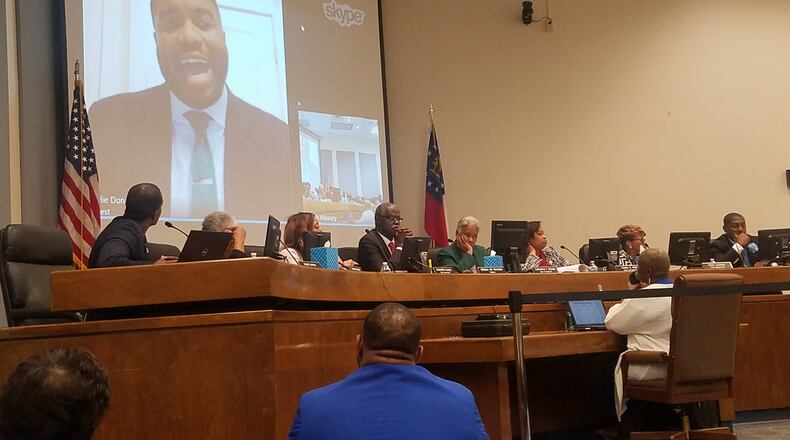"This is going to be a little different than what you're used to seeing," South Fulton Mayor Bill Edwards told residents at a Tuesday night city council meeting.
Behind him, on a projector screen, Odie Donald II smiled. Donald, the director of Employment Services for Washington, D.C., was about to be interviewed for a new job as the city manager in South Fulton. And audience members were going to be able to watch the whole thing.
Normally, politicians go into back rooms to talk about who they will hire and fire. But in the new city of South Fulton this week — and recently, in Clayton County — the process was brought into the public. Whether it was a move for transparency or a tactic to force the votes of reluctant members of city council, though, is a matter for debate.
Jamison Jones, a South Fulton resident at his first council meeting, said he appreciated the chance to see council’s questions and Donald’s answers.
“There should be more of that transparency,” he said. “The only thing that was missing was questions coming from the audience.”
The audience reacted to Donald's answers, though, clapping when he said the people he would really be serving if he got the job were South Fulton's residents — not politicians — and talked among themselves when he said, "I'm the best in the business, there's no doubt about it."
Khalid Kamau, a member of city council, said he was glad that residents had been able to see more of their government's actions. But he worried that council members weren't given enough time to prepare for the interview or deliberate about Donald's credentials. Minutes after the Skype interview concluded, Donald was hired by a 5-2 vote.
“I feel like that was a tactic used to pressure us,” Kamau said. “It can be intense and intimidating to sit in a room with 150-plus people and hear them cheering when certain people talk.”
Kamau said the audience responses didn’t influence his vote — he voted against Donald’s appointment, saying he didn’t like the process, though he said he was eager to work with him — but he thought other council members might have debated Donald’s qualifications more vigorously if residents hadn’t been watching.
“The deliberation afterward would have been different,” he said. “People felt pressured to make a decision because the public was watching. We might not have voted that evening.”
Kamau said Donald’s resume had been distributed to council members the day before the meeting, and they only learned of the planned Skype interview minutes before the council meeting began.
In Clayton County, the process unfolded differently, though with some of the same questions.
In January, Clayton County interviewed three candidates for police chief during an open county commission meeting, a move that made some commissioners uncomfortable. As the process proceeded, some commissioners could be heard whispering their concerns about the wisdom of publicly interviewing the candidates and trying to figure out the genesis of the idea.
The process also created confusion. As the first candidate stepped up to be interviewed, the commissioners asked the other two to step out of the room. But because of open meetings laws, the county attorney told the commissioners that removing the candidates would have been unlawful and that each could stay and hear what his competitor was saying. The men ultimately decided to leave the room as the others were interviewed.
The three candidates for police chief answered three identical questions during the interview to a room of roughly 40 people. Still, commissioners did go into closed session before they voted unanimously to give the job to Kevin Roberts, then deputy chief with the Clayton Police Department. Roberts spoke directly to the small group, which was hoping to wrap things up as snow was falling outside.
“I will make my best effort to enhance the police department and make sure we take care of the needs of the citizens,” he said.
In South Fulton, there was only one candidate, the third Edwards recommended as a city manager after two other contenders elected not to take the job. Edwards said that made it urgent for a hire to be made. He has been acting as city manager since the interim city manager, Ruth Jones, left in October.
After months without a manager, Edwards said he got tired of the “back room politics” and wanted residents to see their government leaders act.
“Let’s do it in public, let’s let all our constituents see,” he said. “You don’t get no more transparent than that, do you?”
Edwards denied that the move was made to pressure anyone, saying he was on the line if council members had voted Donald down.
Kamau said he only hoped Edwards was consistent with his move toward showing the public more about how government worked.
“I hope (Donald) and the mayor will be as transparent and inclusive in developing an economic plan as they have been in this hiring process,” he said. “If we go back to executive session to discuss personnel every meeting, then we’ll know it was a stunt.”
Keep Reading
The Latest
Featured




